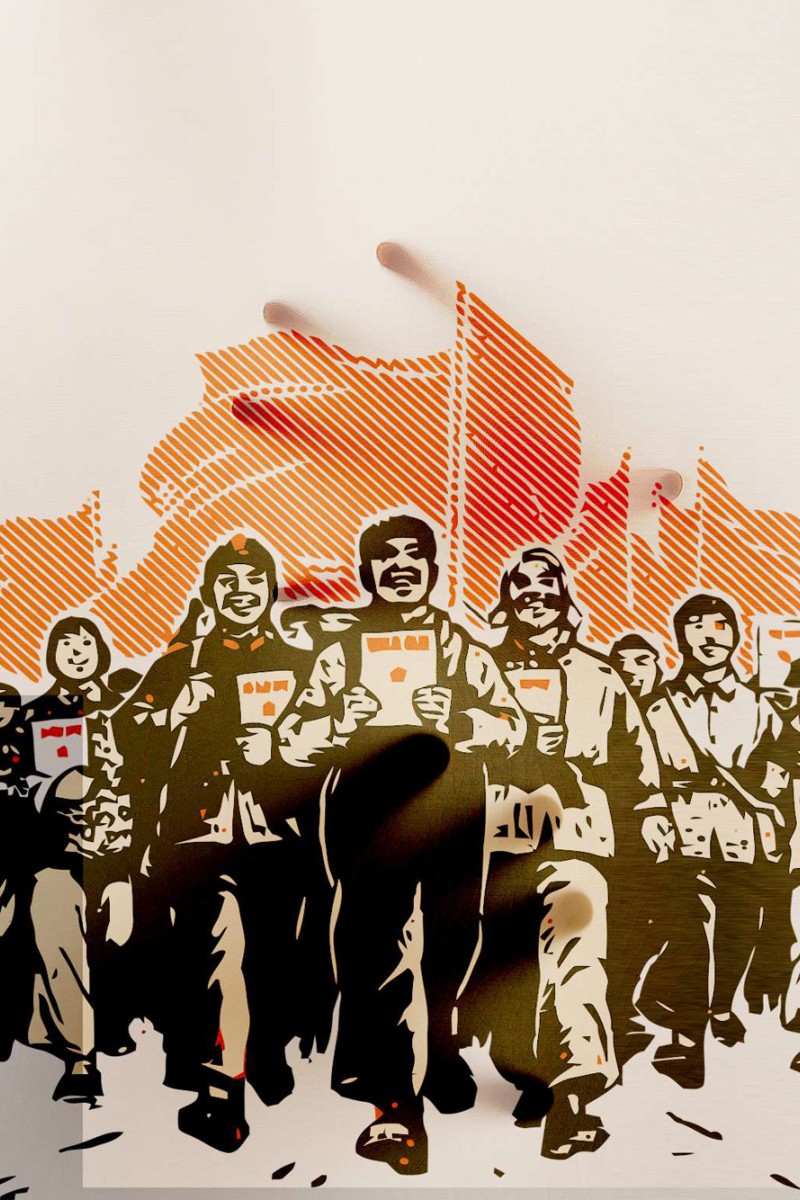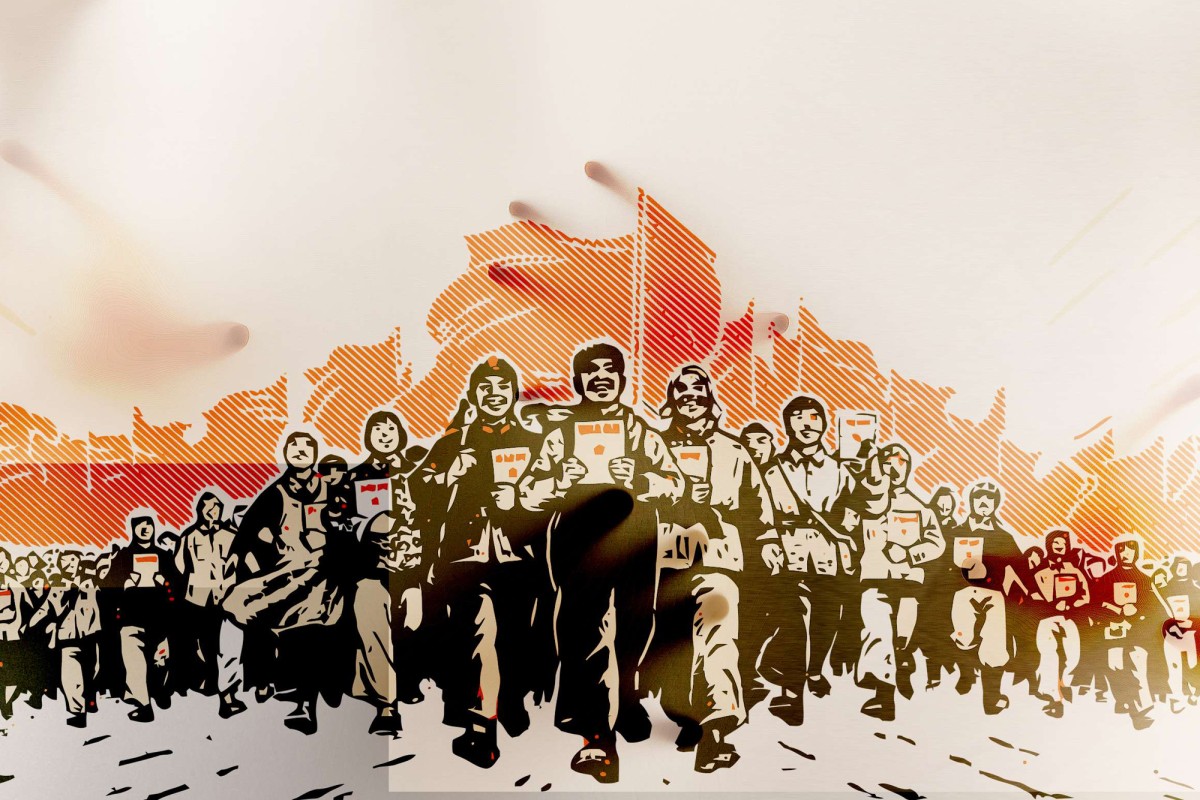
Families torn apart, memories destroyed, propaganda, friends shot dead in cold blood - it's just life during the Cultural Revolution
Monday, May 16, marks the 50th anniversary of the start of the Cultural Revolution, which lasted from 1966 to 1976. Two individuals who lived on the mainland during this time talk about their experiences

The following are two first-hand accounts from people who lived through the Cultural Revolution, and their thoughts, feelings and memories half a century later as we mark the 50th anniversary of the day it all began, May 16, 1966. All names have been changed.
A family torn apart – Fay’s story as told to Young Wang
Both my parents were head teachers at schools in Guangdong in the 1960s. My father came from a family of landowners – the worst type of enemy according to the Communist Party. And even though his family had been faithful to the Party since the 1940s, because they were intellectuals, and part of the “exploiting class”, they were destined to be victims of the Cultural Revolution. And as a result, so were we.
A few years before the start of the Cultural Revolution, my father was labelled a “centre-rightist” – not an extreme rightist, but still on the enemy side. In 1965, my big sister, Ling, a top-scoring student, didn’t get into senior secondary school; the following year my older brother and I were denied the chance to attend junior secondary school.
Impending doom
At the time, we lived on the campus of my mother’s school, while my father lived on his school’s campus. He would come home once every other week.
One night in 1966, before the Cultural Revolution started, I woke up in the middle of the night and heard my father talking to my mother.
A new movement would be starting soon, I heard him say, and there’s a chance it would affect him. If he didn’t come home, it meant something had happened to him; Mao’s “rebels” would have taken him. Then he went on to make arrangements for everyone in the family should what he feared become reality.
My father’s prediction was correct, and it would be years before I saw him again.
In early 1966, Ling, who had just turned 16, was sent 1,000km away from home to a farm in Hainan province (海南) as part of the Down to the Countryside Movement. She ended up spending 17 years on that farm, and it was also there that she married and had her first child.
The Cultural Revolution started when I was in my final year at primary school, where my mother was the head teacher. And she was quickly in the line of fire. The theory behind the Revolution was to turn society upside down, because Mao believed the new and right order would come from chaos. So, naturally, old leaders must first be usurped; everyone from the president of the country to a school head teacher.
At the time, assemblies included the “Down with those in power” ritual, designed to tear down leaders, including head teachers, factory heads, and mayors. We would shout the phrase along with an individual’s name, and sometimes, for me and my brother, that name was our mother’s.
Did I understand any of it at the time? Not necessarily; but it didn’t matter. You had to do whatever the Party told you to.
Looking after Mum and Dad
In the summer of 1967, my mother gathered my siblings and I to tell us that one of her regular study trips might be a little different this time.
“Mum may be away for a while,” she told us. “If I don’t come back, clean up the house and burn everything except the necessities.”
She didn’t come back from the trip, so we burned it all. Our childhood photos went up in flames.
She had arranged for my younger brother and sister, Ping and May, to stay with a relative, and appointed my older brother, Ming, and me to be “liaisons”, because she and my father were being held captive. I visited my mother while Ming visited my father, at the estates where they were under a type of house arrest. Our visits were limited to once a month, but it was all that kept the family together.
When winter came, I visited my mother with some blankets. The “rebels” told me to leave the blankets with them, but I was stubborn.
“My mum asked for these and I have to give them to her,” I told them.
I refused to leave until they gave in and led me to my mum. I felt like a little hero. She was locked inside a small room, with only a tiny window, and I was led to the window where we could talk.
A family friend had told me not to cry when I visited my mum, so I didn’t. But when I left that awful place, I cried, and I cried hard.
My older brother wasn’t as lucky. He didn’t always get to see my father, who was being held on a farm, because whenever my father refused to confess to his alleged crimes, the “rebels” beat him up as punishment, and forbid him from having visitors.
With both our parents held against their will, we had no income. But May, unhappy living with our relative, came home and we took up tailoring work to make money.
Once, the rebels paraded my mother through the streets, as they did with “bad people”, and walked right past our home. May, too scared to look, hid and asked me, “Sis, is that our mum?”
“Of course not, Mum is a great person,” I replied.
Besides, the woman I saw was so skinny, I told myself it couldn’t possibly be my mum, even though I knew it was.
In 1968, my father was allowed to come home every now and then and my mother was released, but things weren’t getting better. A new policy sent all teachers back to their home towns, so my mother, my three siblings and I moved to my father’s hometown. There, we were known as “landowner’s cubs”. We were hated, criticised and harassed. The local militia would barge into our home in the middle of the night, torches flashing and looking for any excuse to take us down.
Reunited
One year later, my father was freed, but he’d lost both his job and party membership. It was up to my mother to feed all six of us with her salary as a teacher. We didn’t have enough money to put all the children through school, so as the oldest girl left in the house, I had to stay home to help care for the family.
In 1969, my aunt came to visit from the remote northwestern province of Qinghai (青海), and offered to take one of us with her. Desperate to go back to school, I went with her and came home after finishing junior secondary school in 1973.
The last couple of years of the Cultural Revolution, which ended in 1976, were quite uneventful. My father even got his job back around 1975.
After it all ended, life carried on. Looking back, I feel like it was all very unfair, but we never spoke of it again. No one wanted to poke at old wounds, and my parents remained faithful to the Communist Party. To this day, they remain faithful and will not tolerate any criticism of the Party or of Mao.
Edurance and enduring admiration – Kai Liu’s account as told to YP cadet Veronica Lin
I was born before the Cultural Revolution started, and was about 10 years old when it began. For 10 years, it was all I knew.
The propaganda game
With politics and propaganda at the forefront, everything else became of secondary importance – including economic development. The Cultural Revolution essentially put the entire country’s progress on hold. Without a stable economy, the whole country was in chaos, and nothing functioned properly. Factories shut down, students skipped school ... pretty much everybody, from top government officials to the general public, was solely focused on the Revolution.
Despite the fact that our family was relatively well-off compared to the rest of the country, we never had enough food. We depended on the monthly food stamps the Communist Party issued, and it was impossible to get any extra. Each adult only received 12 kilos of food per month. Life during the Cultural Revolution was hard.
Growing up, I was brainwashed by Mao’s doctrines. In fact, it was impossible for anyone in China to escape his ideas and vision for the country. His propaganda was broadcast 24/7 on every single TV channel and radio programme. Even our textbooks were filled with Mao’s ideas.
A respect for Mao
We were taught to believe everything Mao said, and to defend and protect Communism. Through it all, I grew to respect Mao more and more. To this day, I strongly admire him for his intelligence, courage and his war tactics. As a leader, he changed the destiny of the Chinese people, and transformed what were once fragmented and colonised states into a unified and independent nation.
But information was limited, as everything was censored. Nothing was critical of Mao or Communism. Because of this, I’m sure I’m not the only one who feels that admiration for Mao has been etched into their soul.
However, my respect for Mao doesn’t mean that living through the Cultural Revolution was not also a very frightening experience. Some school days were filled with fear and heartbreak. With a ban on freedom of speech, many politically active individuals, those with higher education in particular, were taken into custody and killed.
In my late teens, I was part of a student-led organisation called the “mini red guards”. Our job was to protect the building where we worked from different organisations. Even though we were all committed to Mao and his communist ideals, there were still different agendas, which led to groups that opposed each other.
One day, I watched as our student leader, a girl in her early 20s, was shot dead in cold blood while attempting to protect our building from being taken by force.
I forced my legs to move as I ran for my life. But the trauma stayed with me. It still gives me chills after all these years.
A lasting impact
In retrospect, the Cultural Revolution made me realise the importance of a more democratic system. While I still believe that Mao was a great leader, and one who had China’s best interests at heart, he wasn’t perfect.
Back then, we followed Mao without thinking. Now, half a century later, I can look back and say that I think the Cultural Revolution was a mistake.
If all our efforts had gone towards improving China’s economy and quality of life, perhaps I wouldn’t be left traumatised and shaken to this day.